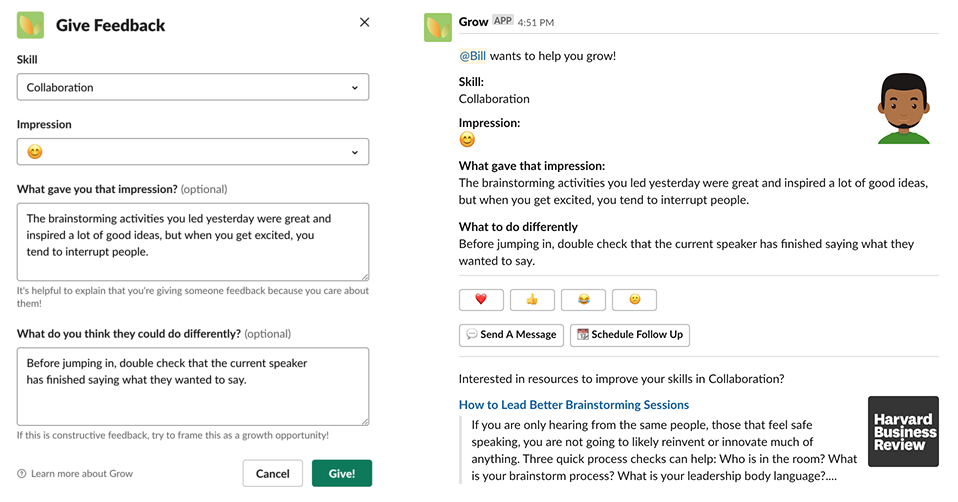Cornell Tech Students Create a Platform for Personal Growth
Categories
Computer Science, Connective Media, MBA, Startup Studio, Startups

Feedback is essential to personal and professional growth, yet people are often hesitant to give it because it can be uncomfortable or they don’t know how to make it valuable.
Cornell Tech students created a digital solution: Grow is a tool that facilitates personal growth through frequent and actionable feedback. Grow nudges people to provide simple, structured feedback inside of the communication channels that teams are already using daily, like Slack.
Ryan Sydnor, Johnson Cornell Tech MBA ‘19, Christopher Caulfield, Technion-Cornell Dual Master’s Degrees in Connective Media ‘19, and Richard Hill, Master in Computer Science ‘19 built Grow during Startup Studio. The team recently won one of four Cornell Tech Startup Awards and received co-working space and pre-seed funding worth $100,000.
Formal vs. informal feedback
The team interviewed almost 100 people — from executives at big companies and small startups to leadership coaches to employees — to find out what would facilitate better feedback. They found there are two primary types of feedback, formal and informal. Informal feedback is often unstructured and infrequent. Formal feedback is more regular, but often less constructive because it is used primarily for careers decisions like promotions and raises rather than growth.
“At the core of Grow, is a simple give-and-request flow,” said Hill. During their research interviews, they learned that people who request feedback get the most in return. “The main thing that differentiates Grow is that we are giving you a formal feedback structure while keeping the feedback private between the giver and receiver. We are seeing that these two things encourage honest, continuous, and actionable feedback,” said Hill.

How it works
The team used Botkit, an open-source tool that enables developers to more easily create an interactive Slack App, sometimes called a chatbot, that users engage with through conversation. Once a user adds the Grow App to their Slack workspace, they can use it to give and request feedback. When people give feedback they fill out a form without needing to leave the Slack interface. It asks them to choose a skill like collaboration or public speaking, an impression like the smiley face emoji for a job well done, what gave them that impression, and what the person could do differently. The recipient gets a Slack notification indicating who sent the feedback and they can send a message back or schedule a follow-up meeting. Grow also recommends resources for improving their skills based on a curated set of articles, books, podcasts, videos, and courses. Companies can also customize these resources in order to surface internal tools to employees more easily. Eventually, they plan to pair people with mentors in their company who have received excellent feedback on the skill someone hopes to improve. They will also be able to match people with coaches outside their organization.
Users can see all of their feedback and progress in one place. Executives can also check the Team Engagement Dashboard to see how frequently people use Grow. In their user research, the team found that people will provide more honest feedback if the communication is private, so executives can’t see the specific feedback people send.
To encourage continuous feedback, Grow sends “nudges” as reminders. After Sydnor took Behavioral Economics for Tech with Michael Sobolev, a postdoctoral associate at Cornell Tech, the Grow team worked with the Sobolev to test different nudging models like asking for feedback on a particular skill once a week and sending daily reminders. They’ve seen successful increases in the provided amount of feedback from people and published a paper with their data-driven analysis to the Association For Computing Machinery’s Collaborative and Social Computing Digital Library.
From Classroom to Company
Sydnor and Hill are continuing to work on Grow full-time. Caulfield is staying on as an advisor. Grow is a freemium business model wherein people can use Grow for free and pay for upgrades like customizing nudges, skills lists, and recommended educational resources. The company has already secured paying customers around the world.
“What our research shows is that employees who are learning and growing in their jobs are happier so they stay around for longer, and increasing retention has a direct impact on the bottom line,” said Sydnor.
Since they launched at the end of January, more than 300 companies have installed Grow, which accounts for over 53,000 people in 36 countries using the app. Some of their immediate next steps include expanding to other platforms like Microsoft Teams and Google Hangouts, hiring developers and designers to the team, and raising additional funding.
“We think people are excited about Grow because the workplace is changing,” said Hill. “There’s an expectation for employees more and more to be independent, scrappy, and proactive and to take ownership of their own personal growth. We think feedback is a key part of that.”


